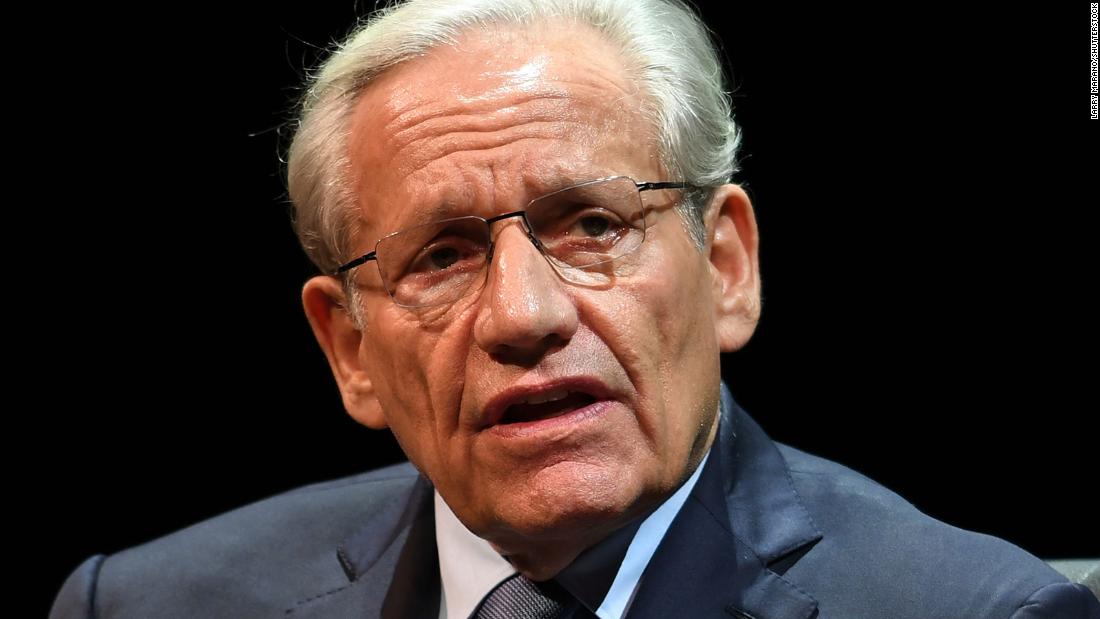
It was their 19th conversation, following 18 interviews[1] that formed a key component of Woodward's book. Trump had privately told Woodward in February he knew critical details about how deadly the virus was, and in March admitted he was playing it down.
On August 14, Trump peppered the veteran two-time Pulitzer Prize-winning journalist with questions about the book and what exactly was in it.
CNN has obtained excerpts of the 10-minute conversation, which show Trump was more focused on the economy than the public health crisis. As the two debated Trump's response to the pandemic, Trump finally asked: "So you think the virus totally supersedes the economy?"
"Oh sure. But they're related, as you know," Woodward responded.
"A little bit, yeah," Trump replied.
"Oh, a little bit?" Woodward asked.
"I mean, more than a little bit. But the economy is doing -- look, we're close to a new stock market record," Trump said.
Trump's question to Woodward underscores the President's attitude toward the virus.
After six months of experts trying to convince Trump that the two are linked -- that an economic recovery depends on first stopping the virus -- Trump is still focused on the stock market and the economy because he believes those are key to his reelection.
In another part of the conversation, Woodward told Trump there are parts of the book the President won't like. "It's a tough book," he said, adding that it's "close to the bone."
"You know the market's coming back very strong, you do know that," Trump responded to Woodward.
"Yes, of course," Woodward said.
"Did you cover that in the book?" Trump asked.
'I acted early'
Woodward and Trump continued to debate Trump's response to the pandemic and how it will be critical to the presidential election. When Woodward told Trump that the election will be a contest between him, former Vice President Joe Biden "and the virus," Trump insisted, "Nothing more could have been done."
He added: "I acted early."
Since the critical details of what Trump withheld about the virus have become public, the President has tried to shift the conversation.
"If Bob Woodward thought what I said was bad, then he should have immediately, right after I said it, gone out to the authorities so they can prepare and let them know," Trump said on Thursday. "But he didn't think it was bad. And he said he didn't think it was bad. He actually said he didn't think it was bad."
Woodward told CNN he never said this to the President.
Woodward said that when he heard Trump talking about the coronavirus being airborne and deadlier than the flu in February, he first had to go out and learn whether that was actually true, since so little was known about the virus and how it was spread at the time.
Trump had mentioned speaking to Chinese President Xi Jinping on February 6, and Woodward wondered if the President had learned those details based on his conversation with Xi. For months, Woodward said, he was chasing after a transcript of that call.
It wasn't until early May, when Woodward learned about a January 28 top secret intelligence briefing Trump had with his national security team, that Woodward started to piece together the story. In that briefing, Trump's national security adviser Robert O'Brien told Trump that the coronavirus would be "the biggest national security threat" of his presidency, and O'Brien's deputy Matthew Pottinger warned Trump about human-to-human and asymptomatic spread of the virus.
Trump also said last week that the calls with Woodward were "quick ones, not long ones." In fact, the 18 interviews totaled nearly 10 hours. In more than a half-dozen cases, it was Trump who called Woodward unexpectedly, sometimes late at night from the White House residence.
As CNN reported last week, many of those calls were made without White House aides knowing about them[2].
Throughout their 18 interviews for the book, Trump sought Woodward's approval, repeatedly asking Woodward whether he was going to write a "good book." The lobbying continued in their final conversation, when Woodward noted that one of Trump's accomplishments after the book had gone to press -- the agreement to normalize relations between Israel and the United Arab Emirates -- had earned Trump rare praise from New York Times columnist Thomas Friedman, who has been repeatedly critical of Trump.
"Tom Friedman? That's nice," Trump said.
"Isn't that something?" Woodward responded.
"He's come a long way. The next one I need is you," Trump said. "But it looks like I don't have it on this book, but we'll get you sometime later, I guess."
A list of all of Woodward's interviews with Trump
Interview No. 1 -- December 5, 2019 (74 minutes)
Interview No. 2 -- December 13, 2019 (88 minutes)
Interview No. 3 -- December 30, 2019 (70 minutes)
Interview No. 4 -- January 20, 2020 (25 minutes)
Interview No. 5 -- January 22, 2020 (36 minutes)
Interview No. 6 -- February 7, 2020 (17 minutes)
Interview No. 7 -- February 19, 2020 (14 minutes)
Interview No. 8 -- March 19, 2020 (40 minutes)
Interview No. 9 -- March 28, 2020 (10 minutes)
Interview No. 10 -- April 5, 2020 (25 minutes)
Interview No. 11 -- April 13, 2020 (35 minutes)
Interview No. 12 -- May 6, 2020 (14 minutes)
Interview No. 13 -- May 22, 2020 (13 minutes)
Interview No. 14 -- June 3, 2020 (11 minutes)
Interview No. 15 -- June 19, 2020 (16 minutes)
Interview No. 16 -- June 22, 2020 (47 minutes)
Interview No. 17 -- July 8, 2020 (17 minutes)
Interview No. 18 -- July 21, 2020 (29 minutes)
Interview No. 19 -- August 14, 2020 (10 minutes)
References
- ^ 18 interviews (www.cnn.com)
- ^ without White House aides knowing about them (www.cnn.com)
from CNN.com - RSS Channel - HP Hero https://ift.tt/3bVj6SF
Post a Comment
Post a Comment